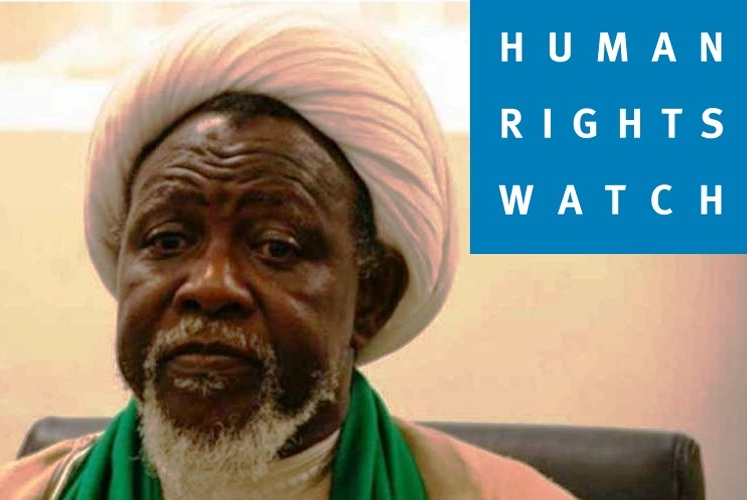(AhlulBayt News Agency) - Human Rights Watch on Wednesday called on Nigeria to end a crackdown on popular Islamic movement and obey a court ruling ordering its leader’s release.
Nigerian authorities should end their violent repression of the Islamic Movement of Nigeria (IMN), a minority Shia group, that began with a three-day lethal crackdown on December 12-14, 2015, and free its leader, Human Rights Watch said on Wednesday 14th Dec.
Sheikh Ibraheem El Zakzaky, leader of the IMN, and his wife, Zeenatudeen, have been detained without trial for a year. On December 12, 2015, the Nigeria army used disproportionate force against the group’s street procession in Zaria, Kaduna State in northwestern Nigeria to clear a route for the army chief’s convoy. In an ensuing three-day violent crackdown, the army killed over 347 members of the group and injured and arrested scores more. The violence against the group continued in a series of episodes in October and November 2016.
“The involvement of soldiers in the Zaria incidents, and subsequent police actions against the Islamic Movement raises major questions about Nigeria’s commitment to military reform,” said Mausi Segun, senior Nigeria researcher at Human Rights Watch. “The Kaduna state government’s continued repression of the group without holding the attackers responsible turns justice on its head.”
Nigerian authorities should hold accountable anyone who has committed crimes against Islamic Movement members, and take immediate steps to comply with a federal court order mandating the release of Sheik El Zakzaky and his wife, Human Rights Watch said.
Human Rights Watch reported in December 2015 that the killings were unjustified and called for an independent and impartial investigation into the carnage.
A judicial commission of inquiry, appointed to investigate the events, found that the army used “excessive force” against protesters and was responsible for the deaths and mass burial of the 347 members of the group.
In a White Paper responding to the report released on December 5, 2016, the Kaduna State government unilaterally declared the Islamic Movement to be an insurgent group against which the army was justified in using lethal force. Contrary to the commission’s findings, the state government stated that soldiers who shot at protesters, laid siege to religious sites belonging to the group, killed 347 members and buried them in unmarked mass graves, acted according to the army’s rules of operation.
The Kaduna State government is seeking the death penalty against 50 members of the group who are facing trial for the alleged death of the only military casualty in the episode, Corporal Dan Kaduna Yakubu. But it has essentially exempted the army from any responsibility for the killings of the Islamic Movement members, and no-one has been held responsible for the deaths.
On October 7, the state government illegally banned the Islamic Movement, citing the commission of inquiry’s finding that the group was unregistered. The move appears to have triggered a wave of police and mob violence against the group’s members participating in its annual religious processions, and the destruction of their properties in Kaduna as well as neighboring Kano, Katsina, Kebbi, Plateau, and Sokoto States, where the police followed the Kaduna example of banning activities of the group. Media reports allege that at least 12 people died in the violence in October, and more than 10 more were killed in subsequent clashes in November.
A federal high court ruled on December 2 that the continued detention without trial of El Zakzaky and his wife by the State Security Services, “amounted to a gross violation of the constitution and the African Charter on Human and People’s Rights.” The court ordered the government to release the couple within 45 days, pay them approximately US$170 million in damages, and provide them with a secure residence in view of the December 2015 destruction of their home. The federal government, in whose custody El Zakzaky and his wife have been detained, has not indicated whether it will comply with the court’s decision.
Hundreds of the group’s members have remained in prison since the Zaria incident and subsequent arrests during religious processions and protest marches to demand their leaders’ release, the group says. A few detainees, mostly women and children, were released but most others have been arraigned in courts in Kaduna, Kano, and Jos for offenses including disturbing public peace, incitement, unlawful assembly, and homicide.
The pattern of violent repressive conduct against the group may violate Nigeria’s constitution, which guarantees the rights to life; personal liberty; freedom of thought, conscience, and religion; peaceful assembly and association; and freedom of movement. Nigeria may also be in breach of its obligations under African regional and international human rights law to protect these rights.
“Nigeria’s federal and state authorities should reconsider the heavy-handed crackdown against IMN members, take urgent steps to protect them, and hold those responsible for the unlawful deaths of group members to account,” Segun said. “The government should carry out its law enforcement responsibilities without jeopardizing its own credibility by ignoring court decisions that rightly seek to check its agents’ excesses.”
/129
source : Human Rights Watch
Thursday
15 December 2016
6:30:58 AM
798277
Human Rights Watch urges Nigeria's Buhari to free Sheikh Zakzaky and end repression of IMN Group

Nigerian authorities should end their violent repression of the Islamic Movement of Nigeria (IMN), a minority Shia group, that began with a three-day lethal crackdown on December 12-14, 2015, and free its leader, Human Rights Watch said on Wednesday 14th Dec.
Human Rights Watch on Wednesday called on Nigeria to end a crackdown on a pro-Iran Shiite Islamic movement and obey a court ruling ordering its leader’s release.
